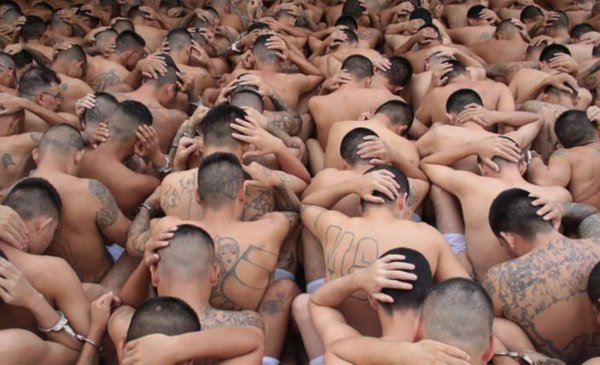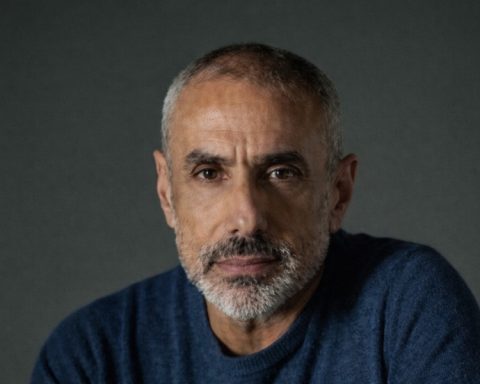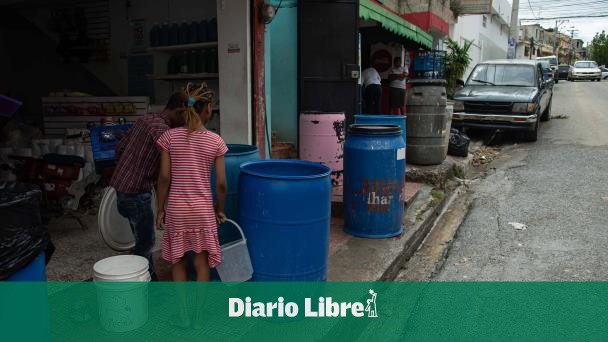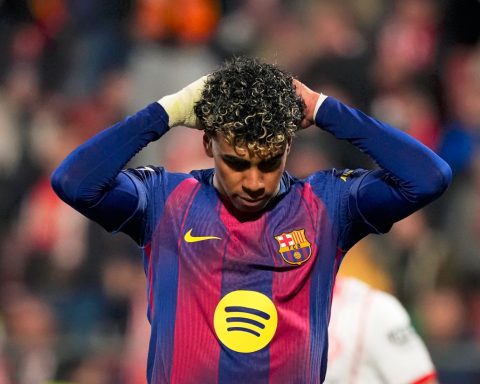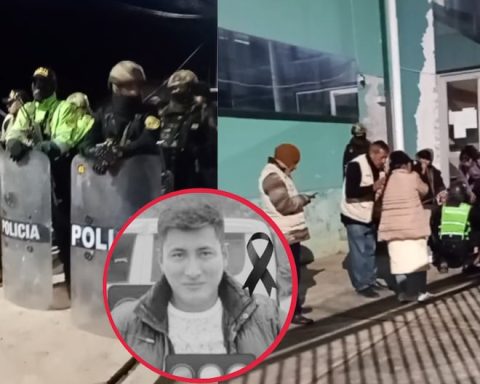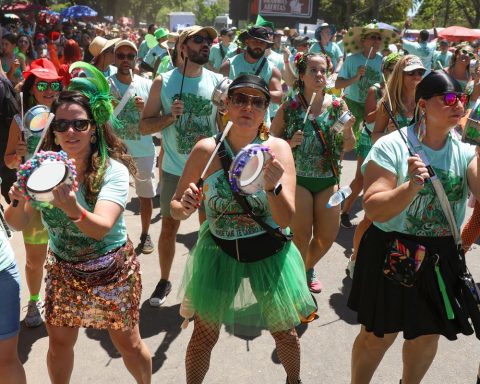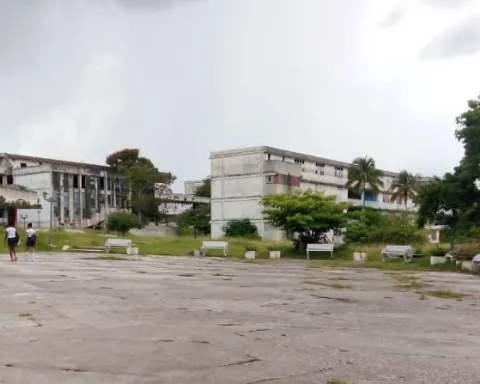A young man, with slicked-back hair, wearing a tight long-sleeved T-shirt that shows off his pectoral muscles, walks staring at the camera and displays the typical smile that politicians wear in electoral advertisements. On either side he is escorted by uniformed men with long weapons, many of whom are guarding the cells of a prison—which promises to be the largest in America—still under construction. That is the first image you saw on the official site of the Presidency of El Salvador. The smiling young man is Nayib Bukele, the “millennial president” now self-proclaimed an “instrument of God” and who is leading a war against gangs (maras) driven by exhibitionism, prison and a heavy hand.
And it seems that his strategy is working. Public opinion polls give him between 85% and 90% approval, including one published at the end of the year in the newspaper with an opposition editorial line. Some politicians around the world —including Uruguayan representatives Gustavo Zubía (Colorado Party) and Rodrigo Albernaz (Cabildo Abierto)— expressed their “admiration” for some of the measures, although human rights organizations such as Human Rights Watch and the government of the United States criticized the action.
And some of the ten Salvadoran families that Uruguay had given shelter —in a resettlement plan that began in 2017— decided to return to their country of origin under the pretext that “now it is safe.”
—Boss: the cousins called us and told us that everything is quieter there… we’re going back to El Salvador.
Clever, the head of the farm in Melilla, listened to the words of Ernesto, one of his employees, at the end of the year when there were less than 20 days left for the first apple harvests.
Ernesto’s family, another family and a distant uncle packed up and left. They had arrived in Uruguay after the Foreign Ministry’s agreement with the United Nations Refugee Agency, in which ten persecuted families were resettled in the northern triangle of Central America, as the triad of El Salvador, Guatemala and Honduras is called.
Mr. P., whose name is withheld for security reasons, also took refuge in Uruguay (although not because of the resettlement program), he also defends the Bukele regime and says that “things are safer”, but he would not leave From Uruguay. “Start again? No”.
He still remembers with a lump in his throat that scene from four and a half years ago. It was six in the afternoon and a few minutes. She had just returned from work. He parked the truck at the door of his house in El Salvador and a boy on a bicycle approached him. The little boy, who “would not have been more than 12 years old”, showed him a mobile phone and told him that he had to answer a call. Mr. P. refused. But the boy, somewhat annoyed, reacted: “If you don’t answer, they’re going to break your ass.”
He had no choice. A serene and convincing voice spoke on the other end of the line: “Let’s be clear: we are from Barrio 18…”. This was followed by a speech in great detail about every movement of Mr. P.’s family, the threat that if he reported to the police his eldest son would die, and the classic blackmail: “You’re going to have to give us $1,000 monthly”.
Mr. P. worked in the oil company and his wife was a lawyer. They had a “good income”, but not enough to give the gang that amount of money each month. They negotiated to give them half. A few weeks later another gang member approached and asked for more money because they had just put one of their own in prison and needed to pay for a lawyer. Later, another gang member appeared and demanded more “collaboration” for a friend who was sick, until at the end of that month the same boy from the first call returned on a bicycle, handed him the phone again, and in a calm and convincing voice mentioned: “Listen, this is not negotiable: you are going to give me $1,000 a month as a bonus.”
La Mara 18 was born on 18th Street in Los Angeles, hence its name, more than six decades ago. In the 1990s, along with her rival Mara Salvatrucha and other gangs, they grew in strength in El Salvador and were responsible for thousands of murders, kidnappings and forced displacements.
Mr. P. and his wife cried enough to clear their minds, until they made the decision: to leave their country. Where to go? A few years before the threats, the eldest daughter had had to represent Uruguay at her school. She studied the rites, learned that mate was not a chamomile tea that is drunk with a bombilla, she dressed as a gauchita and reviewed photos of Uruguayan architecture that had made a good impression on the family. For this reason, in the rush to flee, those memories returned, the mother of the family brought out her skills as a lawyer and inquired into the refugee law, they withdrew their savings from the bank and emigrated with what they were wearing.
Mr. P. still remembers that phrase he threw at the first uniformed man he saw at the Uruguayan airport:
—Officer: my life and that of my family is in danger.
(Unsafety
“El Salvador is a country with fewer homicides; Crime was on the decline at the end of the previous government and the decline accelerated under Bukele. But as we have shown with academic research, and information that is now in the United States Justice, (this drop in homicides) was at the cost of negotiating with gang members for more than ten years, promising them not to extradite their leaders, he asked them for their support election and gave them prison benefits”, he explained to The Observer Óscar Martínez, editor-in-chief of El Faro and one of the many journalists persecuted by the Salvadoran government.
In March 2022, when the Salvatrucha gang murdered 87 Salvadorans in a single weekend under the understanding that the pact with the government that captured gang members heading to Guatemala had been broken, “Bukele changed his strategy and declared the exception regime that takes away constitutional guarantees from Salvadorans and is about to be in force for a year,” recalls Martínez.
Official figures indicate that in a country of 6.5 million inhabitants, 65,000 people were imprisoned in a single year. It is the country with the highest prison rate. “Is that a safer country?” the journalist asks himself and immediately answers himself: “It is a more repressive country.”
The Colorado deputy Gustavo Zubía admits that “there may be excesses in Bukele’s actions”, but, “can we not structure a control system in prisons to avoid that anomie that the Broad Front created?”, he opined on his Twitter account.
His lobbyist colleague Rodrigo Albernaz disagrees that Bukele’s policy should be strictly imitated in Uruguay. But, in a personal capacity and without a consensus from his political party, he says that the Salvadoran president falls into his scheme “of great international leaders, of those politicians who started out with a lot of controversy and now have popular acceptance (…) of those who are coming making admirable policies”.
For the Cabildo Abierto legislator, “the statements about El Salvador made by human rights organizations are unfair, because they are the same organizations that did nothing when that was the most insecure country on the continent.” And he concludes: “Judging by the results, Bukele is not doing badly at all: today is a state of exception, but that will allow normality tomorrow.”
(Unpopular
“Bukele is so popular because he governs in a society disjointed by the violence of 12 years of civil war and the subsequent arrival of gang crime, for which reason the arrest of young people is not seen as a problem unless it is your brother or your son”, says the journalist Martínez, who adds that “to this is added that El Salvador never had a full democracy”.
Bukele —41 years old, promoter of cryptocurrencies and controversial tweeter— aims to be re-elected in February 2024, despite the fact that four articles of the Salvadoran Constitution prohibit it. It is not the first time that he acted outside the regulations: two years ago he went to the Legislative Assembly with the military, the United States Department of the Treasury accused him of negotiating with the gangs and financial transparency irregularities, and before the accusation of his opponents to bleed democracy, he defends himself as an “instrument of God” (a resource, based on the “natural order”, which was frequent in the speech of the Uruguayan dictator Juan María Bordaberry).
“Bukele could be characterized as a populist,” says political scientist Rodrigo Barrenechea. “The populists tend to be usually personalist candidates who use a discourse of blaming the political elite, which they call ‘caste’ or ‘political class’, as responsible for the crisis in a country,” explains the professor at the Universidad Católica del Uruguay and who is doing a post-doctorate course at the prestigious Harvard University.
The equation is simple: on one side is the political elite that does not listen to the people, on the other the populist who claims to understand the problem of citizenship and tries to solve it at the cost of “concentrating power” and “entering into conflict with the institutions ( democratic) of control”. For this reason, Barrenechea affirms, “the populist is strengthened before a people that is disenchanted.”
The term “populist”, clarifies the academic, does not distinguish between left and right. There are some and others. “In Latin America in the late 1990s and early 2000s, when governments had applied free market policies, left-wing populists found fertile ground to emerge. Right-wing populists have had less success in the region, and Bukele is one of the few exceptions, and it has to do with the fact that there are not so many followers of the discourse that there is an elite that causes the ills of society.
Despite this, there are intermediate points. The scientific literature refers to Donald Trump, a great ally of Bukele and who relied on the discontent of an American minority, but coined by an established and traditional party as an emblematic case.
As was the case with Trump, Bukele, who did not come with party support (in fact, he had broken with his historical party) relies on communication through social networks as a way to generate support and closeness to the masses.
Mr. P., a refugee in Uruguay, asks himself: “Is he an anti-system? Yes, but to be in favor of the population and make incredible changes.
Martínez, a journalist in El Salvador, wonders: “What should Uruguay learn from the situation in El Salvador? It should learn to preserve its rule of law, which is what El Salvador did not do: to minimize a mafia, a state mafia is created against all democracy, even though for propaganda purposes tattooed young people are shown in rows”.
